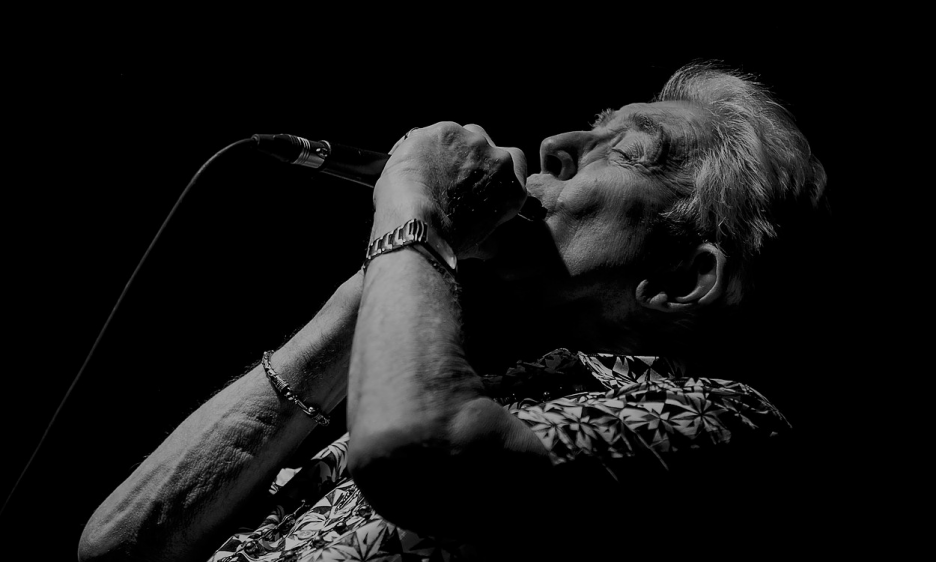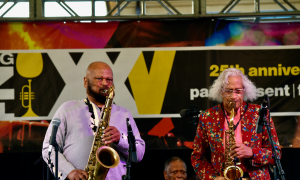Home » Jazz Articles » SoCal Jazz » John Mayall: In The Pocket at 84
John Mayall: In The Pocket at 84

Many years ago, he was dubbed the Father of the British Blues. Rightfully so, as in the early 1960's he created, or revolutionized (depending on your point of view), the British blues in a formidable manner. As a singer, composer, and multi-instrumentalist (keyboards, guitar, and harmonica), Mayall's hard-driving electric boogie is honest, emotional, and real easy to tap your toe to.
Mayall also has much, if not more, distinction as a bandleader. He kick started the careers of many blues and rock artists who went on to formidable careers and fame. Mayall's Bluesbreakers had Eric Clapton on lead guitar prior to Clapton forming Cream with drummer Ginger Baker and bassist Jack Bruce. Bruce also spent some time with the Bluesbreakers. Mick Taylor, who later would join the Rolling Stones, was also a Mayall guitarist. The three men who later founded Fleetwood Mac, guitarist Peter Green, drummer Mick Fleetwood, and bassist John McVie, were all Bluesbreakers. The list goes on and on.
All About Jazz: It is a real pleasure to speak with you this morning. I have been a fan of your music since the '60s. In a long career, there is much to talk about from the past, however, I would like to talk about your new music. You did a terrific new album in 2017. Can we Talk About That? Seems like it was a fun record to make.
John Mayall: Yes, well you know all my records are fun to make. It's very important to get it just right and have everything just where you want it to be. Once you record them and put them out, they're out there forever. Talk About That is another record in the chain that I have put out over the years. I'm very happy with it.
AAJ: It's a very upbeat record with the riff on "Blue Midnight" and the energy of "Across The County Line." Amongst the many fine boogie blues tunes, you have a noteworthy trademark for having at least one song on an album that makes a bold social or political commentary. That song on Talk About That would be "The Devil Must Be Laughing." It's powerful and was also recognized by Independent Blues with the award in the category for the Best Song for the Common Good.
JM: Well you know I make a list of subject matter when I sit down to write songs. One of the things I like to do is keep things up to date. I think the story tells it all about the state we are in. And yes, the recognition is nice. Certainly not something I'm going to turn down.
AAJ: I believe you have another new record that was just released within the past couple of weeks.
JM: Three For The Road is the title of that one. It's my trio format with Greg Rzab on bass and Jay Davenport on drums. We recorded it in East Germany in the middle of a tour. We had the right equipment to do it, and it came out very well I think.
AAJ: Rzab and Davenport have been with you for a number of years now, yes? What can you tell us about them?
JM: I kind of lose count, but it's been over 10 years. They are both from Chicago, so they know what the blues is all about. They do have that background. You know, Greg I've know for many years and he is totally into contemporary blues and all it's history. He is a great player. He suggested a friend of his as a drummer. That turned out to be Jay Davenport. They had worked together and he thought he might be a good fit. You know, it's very important for a bassist and a drummer to be able to be locked in. They have that connection, so that's how that came about.
AAJ: Are you working on any new material?
JM: Yes we are just finishing the new album, which is a studio album. We have a round of guest guitarists on this one. So it will be a nice treat for the guitar freaks.
AAJ: So this would be something like your 66th album release?
JM: Something like that, it's kind of hard to keep track. That would be original albums. There are countless more that are compilations and other things that people have put together over the years. But, I only count the ones that are originals. So that will be another one in the chain.
AAJ: McVie, of course, went on to a great career, but I believe he needed parental approval before he could get started in your band.
JM: McVie was 17 years old or so and working in a tax office, as far as I can remember. He was just beginning to learn the bass. In fact he didn't know what a twelve bar blues was at the very beginning. But he certainly had a natural talent for it. I had to meet with his parents to get their permission to take him out on the road. So we worked that out and ended up playing together for several years.
AAJ: You started your career as a graphic designer. It would appear that those skills have been put to use and have been helpful with most of your album designs.
JM: I have designed most of the album covers over the years. Yes the skill of graphic design has been very useful over the years. I had a long career in advertising and graphic art and again it's been very useful. I have always felt that the music and the pictorial aspect must tie together. I really can't remember a time when I had someone else design one of my album covers.
AAJ: I was talking to your good friend Walter Trout recently. He spoke with reverence in regard to you. In addition to being a lot of fun to play with, Walter emphasized your skill as bandleader in keeping everybody happy and keeping things fun. (For more on Walter Trout and his successful battle with liver disease see Walter Trout: Thriving With The Blues).
JM: Yes if you are a bandleader you want to have the good reputation as treating people fairly and getting on with everybody. It always felt very natural to me. I think the main thing is that the musicians should be compatible and that you should enjoy each other's company. Then that's what comes out in the music. The art of the camaraderie and interplay between musicians is the key to it.
AAJ: You are a member of the Blues Hall Of Fame and An Officer Of The Order Of The British Empire. I think we all know what a HOF is, perhaps you could expound on the particulars and significance of the latter.
JM: That came about as a bit of a surprise. It's definitely an honor in England to have that given to you. It was very exciting to go to Buckingham Palace and have that honor bestowed on me. It was quite the ceremony, and is quite the honor to have that distinction in my career.
AAJ: Other that a shared love of the blues, one thing I do believe that we have in common is that we both started out listening to our dad's old 78 RPM jazz records back in the day. I recall the Oscar Peterson Trio being the first to really grab my attention. What artists really made an impact on you way back when?
JM: I actually met Oscar Peterson many years ago. He was a really nice chap. The artists I would mention go back further. Listening to the early boogie-woogie pianists like Albert Ammons and Jimmy Yancey is really the way I got started.
AAJ: A song the jumped out at me in 1970, while I was in high school, was your "Nature's Disappearing." In it you wrote, "Man's a filthy creature...and we are all guilty of this massive crime." Nearly fifty years later I get to ask you about that well before it's time piece of work. What prompted the birth of that song?
JM: Well, funny enough, it was an article in the Reader's Digest that I happened to come across. It pointed out things that you could do to improve the ecological aspects of the world. So that kind of drew my attention to particular subjects. It wasn't stuff that was much on anyone's mind at the time, but has grown over the years and become a major problem. It's still relevant, and we still play that song in our live shows.
AAJ: Excited to hear that, as my wife and I and some friends are looking forward to seeing you at Club Madrid in Las Vegas (actually Henderson) later this month.
JM: We play a different set list every night. I will try to remember to put "Nature's Disappearing" on the list for that night.
AAJ: Thanks for that! After leaving Manchester, it didn't seem very long after you arrived in London that you were chosen to play opposite blues greats like Freddie King and John Lee Hooker.
JM: It was a major opportunity. Everyone knew all the major blues players. When they came over to England, it was a great chance to learn first hand just by playing with them every night. That was very much the case with T-Bone Walker and, as you said, John Lee Hooker. So, if you play with those guys that have been your idols, it's a great experience. You come out of it learning a lot more about delivery of songs and the volume of songs. Also, the great personal connection you have with the audience. I always welcome that.
AAJ: Am I correct that the group you have now started out as a four piece with a guitarist?
JM: Yes, Rocky Athas is my good friend and was my guitarist. He lived in Ft. Worth. Bad weather conditions grounded all the flights, so he wasn't able to make a festival show we were doing one night. It forced me into the trio situation. We discovered a different aspect of the playing, and I decided that was the way we were going to go for a while. It's very interesting really. It's a whole different way of playing together. We will be having a guitarist in the next configuration. I just like to keep moving along with different aspects of the music.
JM: As far back the early 1970's you moved into a different aspect for a bit with singer/guitarist Jon Mark and saxophonist/flautist Johnny Almond. That was a much softer and acoustic sound. It was quite the departure from your boogie-blues. I remember liking it. I also recall being in the minority at the same time.
JM: It did create a bit of a stir at the time. But, you know, I am always interested in doing new things. I decided to work without a drummer and go more acoustic. It was a bit of an experiment. But I am always looking for different things to do. I still like to push the envelope. I like to give people something fresh and something to talk about.
AAJ: It reminds me of Miles Davis putting out Bitches Brew. Many diehard jazz fans thought he had lost his mind. They didn't get that it was no longer jazz. Instead, the remarkable fusion record became the top selling record at the time.
JM: Well, you know, a musician has the freedom to explore some other things that he can do. I have always believed in that. To this day, I have never played the same set every night. So if you come to a show one night, and then go again the next night, it will be completely different. It's a different set list every night drawn from out of about fifty songs that are in the catalog right now. I think people have appreciated that over the years.
AAJ: In 2014 you released a craftful album entitled A Special Life. Did this record cause you to reflect on your own special life?
JM: Absolutely. That, of course, is where the song came from. Appreciating all things that I have been exposed to over the years. You look back on your lifetime and your achievements and the ups and downs. I really appreciate all the adventures that I have had so far. So we will keep on doing that. It is all indeed been very special!
A Cocktail for 500
The last time I had seen John Mayall in concert was way back when he was a young and vibrant seventy-year-old. Just how much did the now eighty-four-year old legend have left in his tank? That was the obvious and fair question as SoCal Jazz went on safari Saturday night, March 31st at Club Madrid in Henderson (near Las Vegas), Nevada.It was much like a fine wine. Or perhaps better stated as a stoically mixed drink. The easy to groove recipe started with two equal parts of Chicago based bluesmen. Bassist Greg Rzab and drummer Jay Davenport mixed their elements into a tightly blended composite of pure blues. Stir in the Father of the British Blues on vocals, keyboards, harmonica, and guitar, and it popped into a familiar yet refreshing meld.
With a dearth of material to work with, Mayall treated the crowd of five-hundred people to a mix of songs he has written over the past six decades. Mayall is still writing and recording new music. The title track from his most recent studio album, Talk About That, was received well and clearly one of the strong points of the evening.
Playing in a three-piece band these days, without a lead guitarist, lent itself to Mayall stretching out on his keyboards and harmonica. He flourished and delighted the crowd as he playfully had fun on stage interacting with his bandmates. His classic "Parchment Farm" put his lungs to the test as he was either playing a rousing harmonica solo or singing throughout the song. He passed the test with flying colors.
Likely considered his most famous song, "Room To Move" brought the crowd to their feet during a lavish fifteen-minute treatment in which all three musicians stretched, soloed, and pushed the boundaries. A powerhouse throughout the evening, Rzab delivered a particularly dynamic performance.
Ninety minutes came and went down as fast as a gin and tonic. Now more like the grandfather of British blues, Mayall brought back a lot of memories and made some new ones in the process.
Photo credit: Christina Arrigoni (courtesy John Mayall website)
< Previous
VISIONS: Coast to Coast Connection
Next >
Sediments
Comments
Tags
SoCal Jazz
John Mayall
Jim Worsley
United States
California
Los Angeles
Bluesbreakers
Eric Clapton
Cream
Ginger Baker
Jack Bruce
Mick Taylor
Peter Green
Mick Fleetwood
John McVie
Greg Zrab
Jay Davenport
Walter Trout
Oscar Peterson
Albert Ammons
Jimmy Yancey
Club Madrid
Freddie King
John Lee Hooker
T-Bone Walker
Rocky Athas
Jon Mark
Johnny Almond
Miles Davis
For the Love of Jazz
 All About Jazz has been a pillar of jazz since 1995, championing it as an art form and, more importantly, supporting the musicians who create it. Our enduring commitment has made "AAJ" one of the most culturally important websites of its kind, read by hundreds of thousands of fans, musicians and industry figures every month.
All About Jazz has been a pillar of jazz since 1995, championing it as an art form and, more importantly, supporting the musicians who create it. Our enduring commitment has made "AAJ" one of the most culturally important websites of its kind, read by hundreds of thousands of fans, musicians and industry figures every month.
























